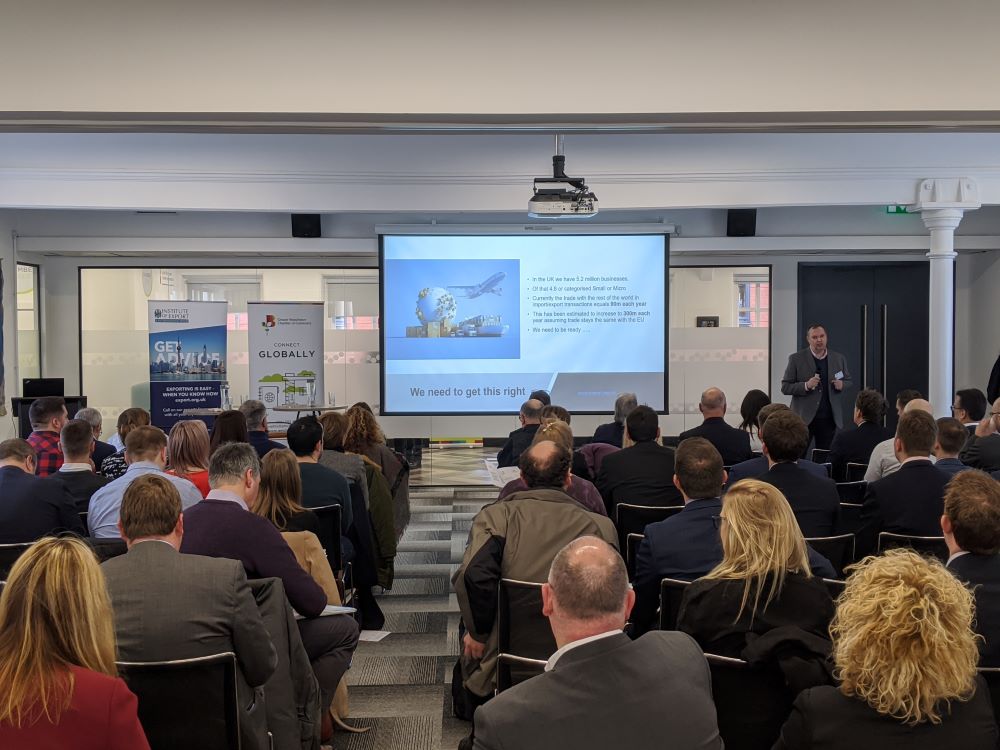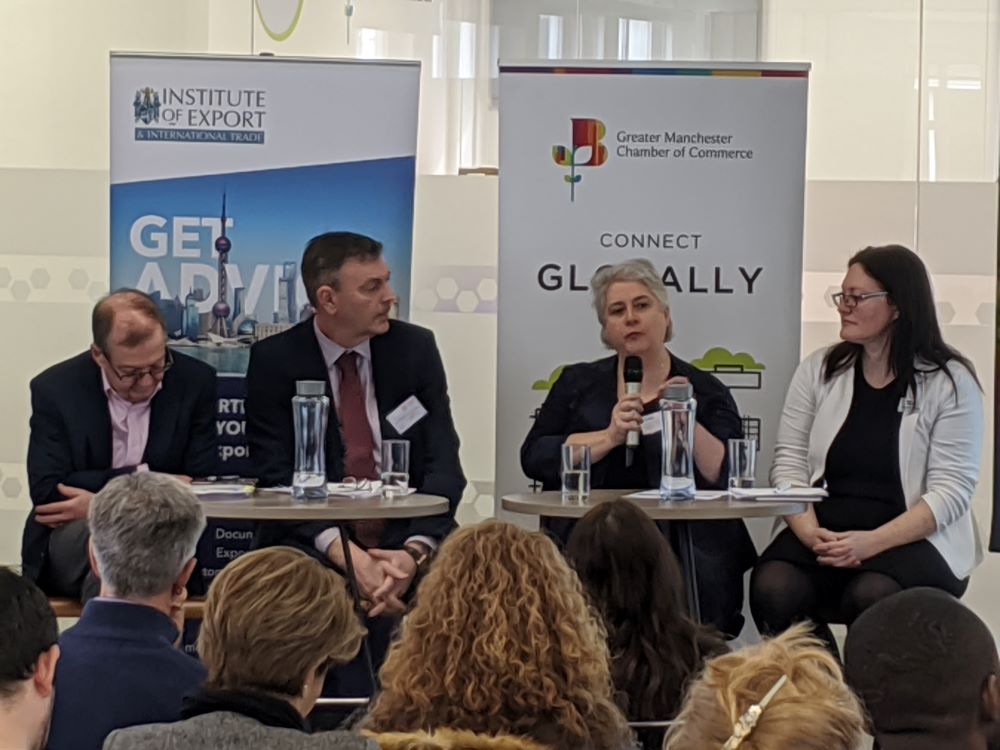
Businesses and industry need to prepare for the introduction of regulation and checks on our borders. This is now a reality and not a worst-case scenario.
This was the major conclusion to be drawn from the Institute of Export & International Trade’s (IOE&IT) first World Trade Summit of the year in Manchester on 12 February, held in partnership with the Greater Manchester Chamber of Commerce.
Previously the idea of non-frictionless trade with the EU had been conveyed as ‘project fear’, but speakers at the event argued that it is now ‘project reality’.
They argued that industry and government need to work together to provide businesses with support and training so that they can complete and comply with new regulations, documentation requirements, and border inspections that goods being moved internationally will be subject to.
Panel discussion focusses on impact of non-alignment with the EU
John Lucy, Manager International Transport & Trade Procedures at the Freight Transport Association, was in attendance for Michael Gove’s speech on Monday 10 February in which he told the logistics industry that the UK will not be seeking alignment with the EU on rules and standards.
Speaking on a panel addressing the ‘Global Trade Landscape’, John noted that the UK will definitely not be a member of the Customs Union or Single Market after the implementation period ends at the end of 2020, thereby introducing new documentary and regulatory requirements for UK exporters and importers.
On the same panel, Clive Memmott, Chief Executive of Greater Manchester Chamber of Commerce, noted that this will have a significant impact on the UK economy if we are not prepared. He argued that the EU needs to be at the ‘front of the queue’ in terms of the UK’s prioritised trade agreements.
Sandra Strong, Managing Partner at Strong and Herd, was the final panellist and she argued that UK businesses need to properly learn about international trade in order to continue trading into Europe. She also noted that businesses need to learn about the new ICC Incoterms ®2020 rules as businesses will need to change the terms they use after the implementation period.

A lot of work needs to be done, but support is out there
The panellists all agreed that businesses should prioritise getting professional advice and support in order to prepare.
Richard Bartlett, Director of Business Development at the IOE&IT, presented the support being provided by the IOE&IT, including its wide range of training courses and Brexit workshops that are fully fundable by the government grants which were recontinued on 10 February. He argued that business need to apply for these grants urgently, as the funding pot is limited.
Susana Cordoba, Head of International Trade at the Greater Manchester Chamber of Commerce, also noted the support provided by the Chamber network around the UK. She noted that there was plenty of room for improvement for exporters in the North West, which is the fifth best performing region in the UK in terms of export.
She also said that exports from the UK to Latin America and Africa had been in decline in recent years – something that will need to be rectified, with six of the top 10 fastest growing markets being in Africa.
Award-winning exporters show there’s plenty of opportunity out there
The Summit’s second panel consisted of three Queen’s Award-winning exporters sharing their experiences entering new markets around the world. They each had different strategies but plenty of success.
Thomas Ogden, Group Commercial Director Cocogreen UK Ltd, outlined the importance of having traceability throughout their supply chain.
Paul Baker, Founder at St Pierre Groupe, advocated for improving your domestic offering by learning new things in different markets. He said that his bakery brands only successfully sold into Tesco in the UK after preceding success in the US market.
Suzanne Alecrim MIEx (Grad), Customer Service and Logistics Manager and DGSA at John Hogg, outlined her company’s preparations for Brexit, noting that the UK leaving the EU will also impact their relationships with markets outside of the EU, where the UK currently has previously had trade deals as a previous member of the EU.
Local businesses get the chance to share their thoughts
The World Trade Summits are always a great opportunity for local businesses to network and share best practice around international trade. With a period of significant change ahead for the UK, these events matter more than ever.
In Manchester we also asked delegates to feed back to us about some of the key questions government and industry need to be focussing on. We held breakout ‘workshop’ sessions covering the three following questions:
- What does sustainable trade growth mean?
- Where are the main opportunities for the UK in global trade?
- What do governments and organisations like the IOE&IT and Chambers of Commerce need to do to support businesses better?
Delegates noted that sustainable trade needs to be understood in terms of both long-term profitability and environmental impact. Traceability in the supply chain and trade digitalisation were both put forwards as key areas to be explored in this space.
Delegates saw opportunities in potential future trade agreements with emerging markets and Commonwealth countries. They also noted that new technologies and supply chain optimisation could facilitate easier trading in the future.
Finally, delegates noted that government and industry need to be more proactive than reactive in its support. They suggested that better signposting to relevant advice and events is needed, also asking for more industry specific events.



